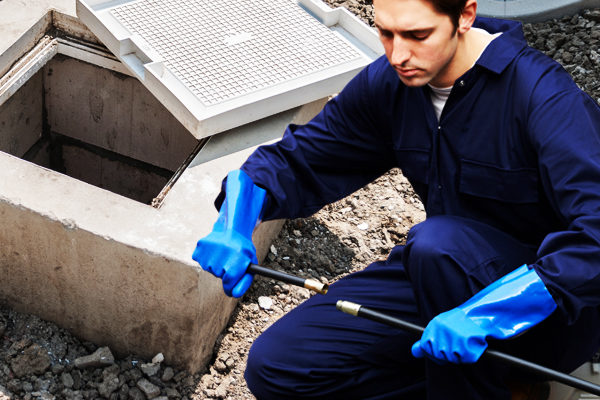Choosing the Right Septic Tank Treatment

A lot of people try to set things up so they have to do as little as possible to maintain their systems, which often leads them to try out various septic tank treatment options. In reading the promises some septic treatment companies make, it sounds like a great deal. All you do is pour something down the drain or flush it in the toilet and voila! The substance breaks down the solid waste in your system, so it runs more efficiently and you don’t have to pump it as often. How do these additives work and which one is the best septic tank treatment to use?
Your Septic Tank is a Treatment Facility
Tanks are specially designed to process household waste and wastewater. All the water from the house enters the tank at a central location. As it enters, a “baffle” helps force new additions down into the tank, so it doesn’t just settle on top. Eventually, those additions start to separate. The heavier waste sinks to the bottom in a layer of “sludge” and the lighter materials float to the top and form a layer of “scum.” The natural bacteria from your own waste is what activates the tank. In fact, that bacteria goes to work and cleans out the water in the tank. After it has been in there for a while, it can safely leave the tank and be disbursed into the soil via your system’s drain field. The bacteria in the soil handles anything else that might be left in the water, but the tank does build up that layer of sludge, and it has to be professionally pumped to make sure that it doesn’t escape the tank or stop the water from leaving.
How Septic Tank Treatment Works
There are generally two varieties of septic treatment on the market. Both claim that they can deal with the layer of sludge, so it doesn’t build up as much and you may be able to forego septic pumping indefinitely. The first option is to add more bacteria to the system. In theory, more bacteria will deal with the sludge quicker. The problem is, there is no evidence that this works at all. It’s money down the drain. The second option is a chemical septic treatment. This can affect the layer of sludge, but not how you might think. Certain brands can make the sludge buoyant, which sends it right towards the outlet, where it can clog lines or contaminate the drain field. Other times, it leaves behind pellets, which still build up, but makes it much more difficult to remove. Neither of these options are good.
The Best Septic Tank Treatment is Proper Maintenance
Sludge will always build up and it needs to be removed by a professional every 3-5 years, or more if you have a garbage disposal. In order to ensure the bacteria in your system does its job, you should:
- Avoid pouring chemicals down the drain.
- Skip antibacterial soap.
- Don’t flush old medications.
- Minimize your use of household cleaners, like bleach.
- Take care not to upset the balance. Fix leaky faucets and don’t overload the system with a lot of water.
Contact Septic Tank Pros Augusta GA for Your Regular Maintenance
When your tank needs pumping or you’d like a visual inspection of the system, let us know. Call us at(706) 204-1717 to schedule your appointment.
